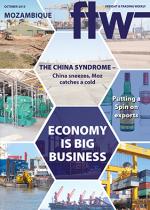Government gets serious about addressing skills shortages
There is a fresh wave
of increased business
confidence in
Mozambique as the new
government starts making a
difference.
According to the Instituto
Nacional De Estatistica,
Mozambique business
confidence rose sharply after the
January appointment of a new
cabinet by then newly elected
Mozambican president Filipe
Nyusi.
Ministers for key posts linked
to the economy were drawn
from business by Nyusi, who
holds a mechanical engineering
degree from Brno University of
Technology in Czechoslovakia
and a postgraduate degree in
management from the Victoria
University of Manchester in
England.
Adriano Maleiane, former
governor of the Reserve Bank,
was appointed minister of
economy and finance.
The minister of trade and
industry is Ernesto Tonela,
who was financial director of
Hidroelectrica de Cahora Bassa,
the company that operates
the Cahora Bassa dam on the
Zambezi.
His deputy is Omar Mitha,
who was chief economist at the
country’s largest commercial
bank, the Millennium-BIM.
Appointed as minister of
land, the environment and rural
development was prominent
businessman Celso Correia,
founder of the Insitec group.
Nyusi and his government
also seem to be serious about
addressing Mozambique’s skills
shortages.
Luis Ferrao, formerly the vicechancellor
of the publicly owned
Lurio University, has been
appointed minister of education
and human development, with
prominent linguist Armindo
Ngunga as his deputy.
Higher education is taken out
of this portfolio and merged
with science and technology to
form the ministry of science,
technology, higher, technical
and professional education,
under Jorge Penicela Nhambiu,
an associate professor of
engineering and chairperson
of the National Science and
Technology Park.
But, the minister most
mentioned in freight and trading
circles is Carlos Mesquita,
who heads up transport and
communications.
He is the former head of
Cornelder de Mozambique
(CdM), the company that runs
the port of Beira, and will
have known the Mozambican
president for some time.
Prior to his appointment to the
cabinet by president Armando
Guebuza, Nyusi worked for the
state-owned Mozambique Ports
and Railways authority (CFM).
He became executive director
of CFM-Norte, the northern
division of the company, in 1995,
and joined the company’s board
of directors in 2007.
CdM is a joint venture
between Dutch company
Cornelder and CFM.
Showing its close relationship
with its neighbour, Mozambican
business confidence after
January dropped sharply
together with that of South
Africa.
However, since June
Mozambican business
confidence is on the increase
– and is higher than South
Africa’s.
Leaders in the logistics
sector interviewed by FTW see
the appointment of ministers
with practical experience in
the movement of freight as a
positive.
The cabinet will have to steer
the economy carefully in order
to escape the current doldrums
caused by the Chinese slowdown
and the drop in commodity
prices – including that of oil and
coal, which have the potential
to fundamentally change the
Mozambican economy.
Some fixes are relatively easy.
As one forwarder pointed out
Maputo is one of the cheapest
ports in Africa in terms of
port fees, but when one adds
government taxes it becomes one
of the most expensive.
A number of managers also
commented that schooling had
improved since the end of the
civil war and the first multi-party
elections in 1994. They are finding
it much easier to recruit local
Mozambicans with the necessary
educational qualifications.
Investment in roads, rail and
ports will take a little longer to
have an impact on reducing costs
– but it is happening, with the
support of the new cabinet team.
It is not only the local business
sector which is more positive.
According to a Chatham House
report, “foreign investors are
committing to Mozambique,
and this can only have been
encouraged by recent political
developments”.
The authors of the report are
confident that Mozambique will
become a major energy exporter.
“The market for LNG (liquid
natural gas) is strong – especially
in East Asia.
“Looking ahead by some years
to 2020–25, LNG markets in the
United States and Europe should
also become more attractive,
as domestic production winds
down in the former and North
Africa’s supply to Europe begins
to dwindle.
“The long-term view of
Mozambique’s LNG prospects is
good – albeit more modest than
spectacular.
“In addition to LNG
development, there are significant
investments under way in
agribusiness (biofuels production),
coal, non-hydrocarbon minerals
and fisheries,” it says.
All of which means that there
will be plenty of opportunities for
companies in the logistics sector
in the years ahead.
Moz puts business people at the helm
21 Oct 2015 - by Ed Richardson
0 Comments
Mozambique 2015

21 Oct 2015
21 Oct 2015
21 Oct 2015
21 Oct 2015
21 Oct 2015
21 Oct 2015
21 Oct 2015
21 Oct 2015
21 Oct 2015
21 Oct 2015
Border Beat
Featured Jobs
New
